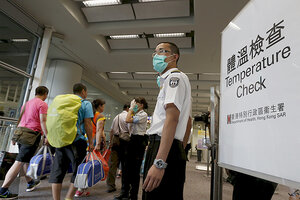China takes precautions as MERS virus spreads in South Korea
After its handling of SARS and swine flu in 2002 and 2012, China appears to have learned lessons on how to manage public health crises. In South Korea, the number of confirmed MERS cases has reached 95.

Arriving flight passengers go through a temperature check at Hong Kong Airport in Hong Kong, China, June 5, 2015, as a cautionary measure against Middle East Respiratory Syndrome (MERS). South Korean authorities squabbled on Friday over their handling of an outbreak of Middle East Respiratory Syndrome (MERS), as a fourth person died and five new cases were reported.
Bobby Yip/Reuters
Beijing
As Chinese authorities brace for a possible outbreak of the deadly Middle East respiratory syndrome (MERS) virus here they are so far steering clear of the sort of draconian steps they imposed when swine flu threatened the country six years ago.
But the government’s quarantine rules are still much stricter than in neighboring South Korea, where nearly 100 people have been infected and seven have died.
The virus is spreading in South Korea, forcing the closure of thousands of schools and leading the government to recommend that 2,300 people at risk stay at home in voluntary quarantine. The police have been asked to monitor those peoples’ cell phones to track their whereabouts.
In China, meanwhile, 75 people who came into contact with a visiting South Korean later found to be suffering from MERS were all located and immediately put into mandatory quarantine for two weeks. None of them have shown any symptoms; the tourist is so far the only case of MERS to have been diagnosed in China.
“China has an advantage in these circumstances,” says Huang Yanzhong, a professor of public health at Seton Hall University in New Jersey. “As an authoritarian state it is able to mobilize the bureaucracy and the police to locate and quarantine people in a very efficient and speedy manner.”
But the authorities have not gone nearly as far as they did in 2009, when H1N1 influenza appeared in Mexico and the US. At that time, China banned all flights from Mexico the day after it confirmed its first case. For two months, agents in full hazmat suits boarded every arriving international flight to take everybody’s temperature. If one passenger registered more than 37.5 C (99.5 F), everyone onboard was quarantined.
That was “perhaps a little bit of an over-reaction,” says Li Zhizhun, a doctor with the US Centers for Disease Control office in Beijing. “The response this time is more realistic. They are taking decisions more scientifically now.”
Containment, relying on quarantine for potential victims, “makes sense” in the current circumstances, since there is no known cure for the virus and it is still not widespread in Asia, says Prof. Huang. “Quarantine is the only effective approach,” he says.
Less communicable than SARS
MERS is tied to the same viral family as severe acute respiratory syndrome (SARS) that for a time in 2002 panicked and immobilized China after spreading from Guangdong Province in the south. MERS first appeared in Saudi Arabia in 2012 and is thought to have originated in camels.
The World Health Organization says there is no evidence of sustained human-to-human transmission of MERS, making it much less communicable than SARS or H1N1, though it is more deadly in those who are infected.
South Korean authorities have come under fire for their handling of the outbreak of MERS following the return of a businessman from Saudi Arabia last month. Officials at first refused to identify the 24 hospitals where the virus had been identified, and gave conflicting advice over whether or not citizens should wear masks.
“South Korea did not handle this outbreak well,” says Huang. “There was miscommunication between government agencies and the government failed to communicate with the public in a consistent, authoritative and timely manner.”
The Korean authorities have also allowed most of the people sent into quarantine to stay at home and simply promise not to leave. Not all of them have kept that promise, officials in Seoul say, and potential victims meant to be in isolation can easily evade detection by leaving their mobile phones at home.
Chinese authorities, on the other hand, do not leave such things to chance. Under its MERS control protocol, updated last week, all patients with unexplained high temperatures must be questioned about their recent travel and contact with animals. People who have been in contact with confirmed cases face mandatory 14-day quarantine, and those who have been in contact with suspected cases are kept under medical surveillance at home.
Twelve years ago, when SARS struck, “the Chinese government response was slow and conservative and they didn’t want others to know the real situation,” trying to keep the virus a secret, says Dr. Li. “Now, with experience of SARS and H1N1, they have changed their attitude."

